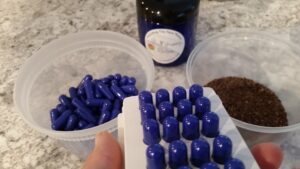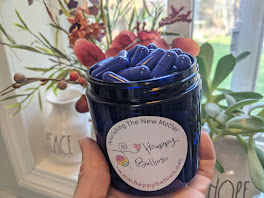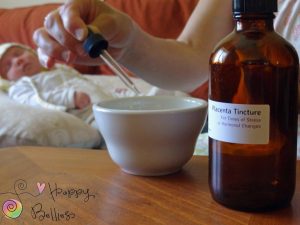Channel 3 MiVT: Placenta Encapsulation in Vermont
Tara Carpenter, PES.
Serving new mothers in Vermont and New Hampshire with an FDA-approved traditional Chinese medicine method since 2011.

Originally published in 2013.
By Gina Bullard
STOWE, VT.
At first glance it’s hard to tell if Tara Carpenter is a chef or a medical examiner. She’s actually a certified placenta encapsulation specialist.
Carpenter turns a woman’s placenta into pills — post birth. “I’ve got a nutritional background which brought me to this work,” she said. The placenta contains iron, hormones, protein, B vitamins, and other nutrients to support new moms.
Carpenter — who started the business, Happy Bellies, believes new moms can recover from births faster by eating their placenta made into pills. “A woman’s body is most receptive to hormones inside the placenta capsules in the first weeks after birth because takes about 3 weeks after baby is born for her hypothalamus to begin producing hormones again” she said.

Carpenter says ingesting placenta pills (in plain or grape flavored capsule) can replenish vitamins like B6 and B12 and hormones after birth and increase milk production.
Carpenter starts the encapsulation process within 72 hrs. of birth — in the new mom’s kitchen. “There’s a lot of science behind it all,” she said. The placenta is prepared with a Traditional Chinese Medicine (TCM) method until it’s a dry powder – then it’s placed into the mom’s choice of plain or grape flavored capsules. There is little to no smell during the process.

Reporter Gina Bullard: Why don’t more people do this if there are many benefits? Tara Carpenter: “I think many women don’t know about it.
With the encapsulation fee you receive as many pills as your placenta makes — which Carpenter says averages 85-180. They can also be frozen and used years later — during stressful times or menopause. She also offers placenta art prints, placenta tincture, and tea cubes.
“I know the hardship of being a new mom, I see how much help this gives to them, and helping in this way has shaped my life” she said.

Carpenter trained with Placenta Benefits (PBi) and follows OSHA guidelines to handle blood-borne pathogens and medical waste. This may not be for the squeamish, but Carpenter says that’s where she comes in. Once the pills are made, you’d never know the process. “Many moms don’t care to know, they just feel great taking them”.
Carpenter loves being on-call and making placenta pills. She says her clients are diverse and not just new age hippies like some people might think. “I feel like I was made to do this work. I feel grounded when I work with a placenta and miss it if I don’t get one in my hands at least once a week” she said. Not your usual job, but one she believes in.
Carpenter travels throughout Vermont to encapsulate for new mothers.
Here’s to hoping her ‘Made in Vermont’ pills help new moms!
Please email tara@happybellies.net for all inquiries.

Online Booking
Eat My What? (newspaper article in The Bridge)
Disclaimer: Benefits of placenta encapsulation are supported by ongoing research. However, statements on this website aren't evaluated by FDA and products from these services aren't intended to diagnose, treat, cure, or prevent disease. Please make your decision in regards to consuming your placenta with a licensed medical practitioner. Tara Carpenter, CPES. is a Certified Placenta Encapsulation Specialist and not a doctor, holistic practitioner, pharmaceutical representative, or herbalist. Women who utilize this service take full responsibility for using placenta capsules at own risk.

